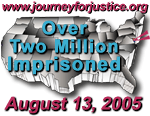 Tips on Conducting
Good Press Interviews Tips on Conducting
Good Press Interviews
1. Phone Calls: Return calls from members of the media
immediately. Remember that journalists are on tight deadlines
and need quick responses.
2. Prepare: Ask the journalist what the angle is before
the interview starts, and draft two or three essential points
that you want to get across. Whenever possible, provide the reporter
with background information or statistics prior to or immediately
following the interview.
3. Decorate: If the interview is taking place in person,
and a camera potentially involved, display posters with slogans
visible in the area around you. If the interview is in an office,
at the very least, take your computer screen to www.november.org
or www.journeyforjustice.org. If you have an imprisoned loved
one, have a large picture, framed and on your desk, or on end
table if in your home - or where the interview is going to take
place.
4. Listen: Really listen to the question that
you are being asked. Take time to formulate your response before
you start to answer.
5. Tell Your Story: If you have a drug war story -
tell it. Be quick and concise and then make broader points. Don't
let the interview seem as if you are the only victim of the war
on drugs. Do not get into the details of a complicated drug conspiracy
story. Leave out the informant's name, the prosecutor, and the
judge unless the story is about the details of your loved one's
case. Remember that the injustice of the war on drugs has touched
millions of lives -- stress that with any personalization of
the injustice.
6. Be Honest and Accurate: Answer questions honestly
and openly. If you are unsure or uncomfortable with the information
feel free to say, "I am not positive about that, but I will
find out for you." Speak and answer within your experience.
It is okay for you not to have a particular answer, and saying
so is better than saying something incorrect, exagerrated, or
misleading.
7. Think Sound Bites: Keep answers short and to the
point. Think in five word answers that avoid acronyms. Assume
your audience is the "Average Joe" who knows nothing
about your expertise, little about drug war injustice.
8. Traps: Be careful to avoid repeating an interviewer's
words and try not to answer hypothetical questions. Never speak
"off the record"; say only what you would want to see
in print. Also, prepare for the three questions you hope are
not asked.
9. Relax: Smile, make eye contact and be assertive.
Remember that you are the expert and the much-needed source for
the story. This is an opportunity for you to showcase both your
knowledge, the issues and groups working on them.
10. Wrapping Up: Thank the reporter and ask what else
you can do to help. As a useful media resource, you and the November
Coalition become the much-appreciated "go-to" source
for future stories.
11. Utilize Resources: If you are ever unsure about
your message or the integrity of the interview, contact the staff
of the November Coalition moreinfo@november.org. We are here
to help you build a positive and successful relationship with
the media.
Adapted from Portland State Unniversity's Tips on conducting
good press interviews 

|









